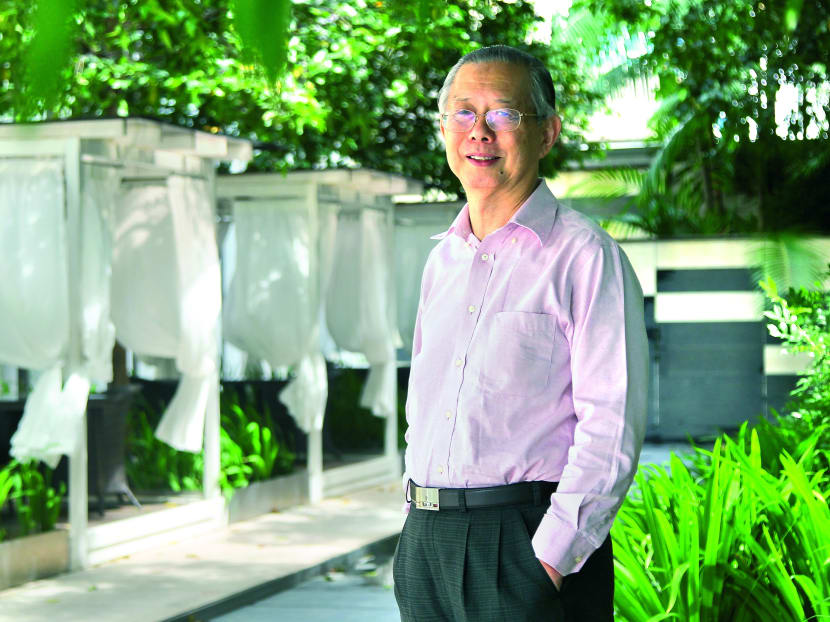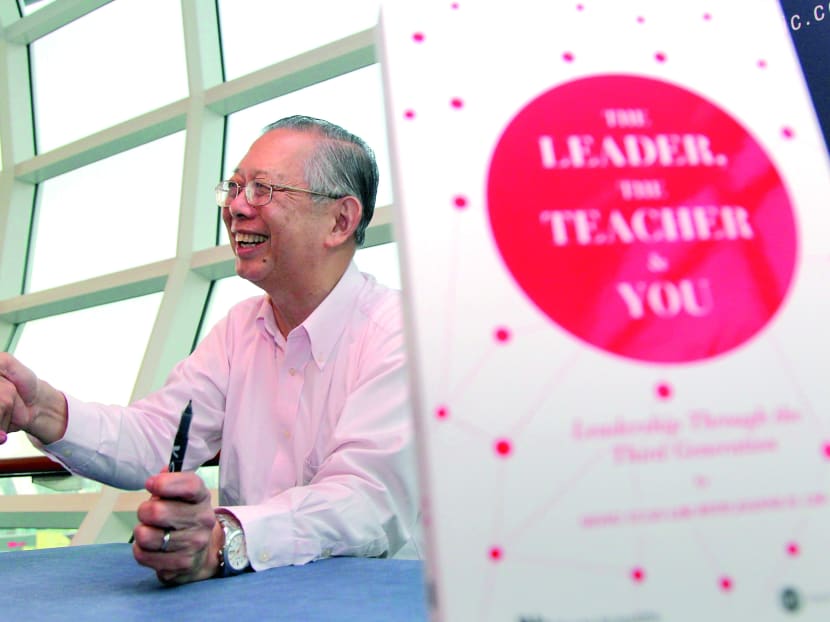Taking it personally
Pragmatism, rather than a desire to serve the public, drove Mr Lim Siong Guan to take up the Colombo Plan scholarship awarded by the Public Service Commission.


Pragmatism, rather than a desire to serve the public, drove Mr Lim Siong Guan to take up the Colombo Plan scholarship awarded by the Public Service Commission.
The son of a taxi driver father and a schoolteacher mother, Mr Lim — who went on to hold the post of Permanent Secretary in several ministries and eventually head the Civil Service — knew that without a scholarship, he could not have gone on to university.
Yet, when speaking to TODAY ahead of Wednesday’s launch of his book on leadership, which draws largely from his 37 years in the Civil Service, it is the subject of public service that makes Mr Lim sit up, lean forward and speak with more force, occasionally tapping the table for emphasis.
Asked what kept him in the service for nearly four decades, Mr Lim, now Group President of GIC, answers swiftly: “Because it was fun. What I find very interesting is thinking about the future. Strategising.”
DEFYING THE SCEPTICS
For Mr Lim, 66, the success of Singapore is personal. Beginning his career only four years after the Republic became independent, Mr Lim, who worked for former Minister Mentor Lee Kuan Yew as Principal Private Secretary and also for former Deputy Prime Minister Goh Keng Swee, took pride in “defying the pundits”.
“I was driven by the idea of Singapore being a small place, (with) people saying, ‘How is this place going to survive and do well?’. To me, it was a very personal thing — we must prove the pundits wrong, there (was) no reason for us to think like that,” he says.
His book — co-written with his daughter Joanne H Lim — shares numerous personal anecdotes from the course of his career, and what he hopes will make an impression on young Singaporeans is “the spirit” of his generation. “The spirit of discovery, the spirit of trying, the spirit of learning, that is what we are trying to convey,” he says, over lunch at The St Regis Singapore’s LaBrezza restaurant.
In particular, he highlights the 21 years he spent in the Ministry of Defence (MINDEF) as a “remarkable period of learning and experimentation” and quotes an adage of the late Dr Goh, who was the Defence Minister when he was the Director of Finance at the ministry, in his book: “The only way to avoid making mistakes is not to do anything.”
THE ‘NO 1’ MINDSET
Is he concerned that the youth of today lack the drive of the pioneer generation?
Mr Lim, who firmly believes that success and survival are “two sides of the same coin” for a small country like Singapore, says that what the Republic needs more of is a “No 1” mentality and a willingness to take risks.
“There is a big difference between the No 1 mentality and the No 2 mentality,” he says. “No 2 operates on the basis of copying other people, letting them do all the groundwork, letting them do all the discovery and you go in and copy.
“The mentality of No 1 is distinctly different. There is nobody in front … (You) have to think for yourself. I think many things are possible in Singapore, but our people need encouragement and ... need to be prepared to think differently, to see mistakes as opportunities to do better the next time.”
This, he says, calls for leadership “with imagination”. “If we have leadership who are not held back by this sense of ‘We’ve never done it before’, and questions all the time ‘Why can’t we do this?’, and people can be motivated … Singapore can do great things.”
Education — to build children’s confidence and encourage independent thinking — is only part of the equation.
“If you don’t apply (what you learnt) in the workplace, you’re soon going to forget it anyway. I think we have to tackle the issue of what’s the workplace like — does a workplace encourage (innovative thinking)?” he says.
CORRECTING POOR IDEAS
Asked whether today’s culture of criticism — amplified by social media — makes decision-makers averse to taking risks and innovating, Mr Lim responds: “If you look at it as, ‘I want to keep improving to be able to get the job done better’, then feedback and complaints can seen as, ‘I have to go in and find out (how to solve that)’.”
He adds: “At the same time, we are all human beings, we live on encouragement … people (should) also acknowledge effort, attitude and express appreciation that people have tried.”
An episode from his MINDEF days recounted in his book illustrates a lesson he learnt from Dr Goh, about how fear of telling the truth can get in the way of learning from past mistakes.
“Dr Goh once decided that SAF (Singapore Armed Forces) camps should plant papaya trees to enhance the use of land and provide an additional source of nutrition for the troops. As with any initiative, Key Performance Indicators (KPIs) were established.
“Not all camps were successful despite their best efforts, because some terrains would not yield healthy papaya trees. However, rather than declare their failure, a few units took to buying papayas and papaya trees to keep up with their regular reports of the KPIs. The experiment was finally abandoned when it was plain that some units had perpetually young papaya trees!”
The experiment was a lesson in how honesty and integrity can “so easily be undermined” when people are afraid of telling the truth. “The opportunity to learn and correct poor ideas in good time was missed,” Mr Lim wrote.
DELIVERING ON PEOPLE’S TRUST
But have the corruption scandals involving civil servants in recent years — the conviction of former Singapore Civil Defence Force chief Peter Lim in a sex-for-favours trial last year, the imprisonment of former Singapore Land Authority Deputy Director Koh Seah Wee in 2011 for cheating the Government of more than S$12 million — eroded public trust in the Civil Service?
Mr Lim’s response is measured. “The most important quality of government is trust and people need to trust government in two dimensions — that the government is aware of their concerns and is focused on helping the people the best way possible, (and) that the government has the competence to meet challenges and deliver the solutions. You need trust on both counts,” he says.
He notes that the public today expects to be heard and consulted to a greater degree than in the past. “In the past, the fundamental needs were much more easily identified and the Government could deliver in a much more direct way. Education — build schools. Housing — have the HDB (Housing and Development Board) build a roof over your head.
“Today it’s a lot more difficult, in the sense of the multiplicity of desires. Different people require a different degree of help. Different people have different aspirations for the future.
“Maybe people will have to recognise that they have to help themselves, because each of us has our own hopes and desires. And maybe the job of the Government is to enable you to get on with it and chase after your own dreams, rather than say that the Government has to deliver on that dream. Maybe today, the multiplicity of desires means it’s far too difficult (for the Government) to do that.”
LONG-TERM VISION
With his deep-rooted belief in the importance of the role of government, did he have hopes that his children — he has three with his wife, Jennifer, and has four grandchildren — would follow in his footsteps into public service?
Mr Lim responds with a laugh: “Sometimes my kids tell me ... maybe I think (it’s) a lot more positive than it actually is ... maybe I believe in my own ‘koyok’, my own propaganda.”
At this, daughter Joanne, a branding consultant who is with us at lunch, chimes in: “No! He is really a wonderful dad, a very encouraging dad.”
Although he retired from the Civil Service in 2006 — he is emphatic that the old must make way for new blood — Mr Lim has scarcely broken pace since. He was Chairman of the Economic Development Board from 2006 to 2009 and has served in his current role at GIC since 2007.
Both roles suited his passion for thinking about the long term, which he says made him suited for his career in Government. At MINDEF, for example, the time from conceiving of the need for a weapon to putting it into operation could take 10 years, with the need to plan for contingencies and “think about what the future will be like”.
“Most of the commercial sector is never so (far-sighted),” he says. “That is the wonderful thing about government and, particularly, government in Singapore. It really gives you scope to think long-term and defy the pundits.”
Indeed, he is seemingly inexhaustible in his pursuit of excellence. “I don’t go into a job and think ‘I’ve made it’. I go into a job and I’m going to ask a lot of questions: Why are we doing what we are doing, and can we do better? And that is what keeps me going,” he says.






